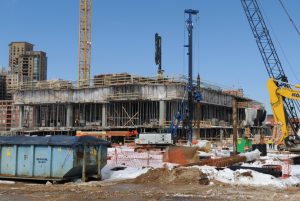 Sunday, August 8, 2021
Sunday, August 8, 2021
For some time now, I’ve been arguing that city government urgently needs to encourage significant investments in all-inclusive neighborhood economic development. As part of that effort, I’ve been wondering if the city has, for decades, squandered huge amounts of financial and political capital on downtown projects – precious resources that should have been spent in other ways in parts of the city where families are struggling to get by.

This is a screenshot from the Baltimore Development Corporation website. Note the BDC’s slogan. Catchy, but what exactly does it mean?
To clarify matters, the economist in me filed an MPIA (Maryland Public Information Act) request on March 25 with the MPIA contact at the Baltimore Development Corporation (BDC). The BDC is a non-profit entity that the city uses to encourage development. The MPIA is the Maryland equivalent of the federal government’s FOIA, the Freedom of Information Act. Legislation like these acts helps assure us that government is “transparent,” as people like to say nowadays, in its handling of the public trust.
And so, I sent an MPIA request to the BDC – which is subject to MPIA law – for nothing more than a list of projects it had funded since January 1, 2000. Just a list with basic information, such as their location and investment in these projects. I tried to find a list online, but couldn’t, not even at the BDC website, so I thought I would submit a formal MPIA request and, as required by law, have the data I need within 30 days or less.
Naively, I assumed that the MPIA contact inside the BDC would just go to her file cabinet or computer, pull out the list they keep and send it to me. I mean, why not? The BDC is a city government agency the sole of objective of which is to fund city development projects for the benefit of the people of Baltimore. It should not only have a list, it should be proud of its accomplishments and encourage public discussion and review.
What happened instead is that I heard back, not from the MPIA contact at the BDC, but from an attorney with the city’s Department of Law telling me that no such list exists and that I will not be getting one from the BDC, not even if I pay the clerical costs for them to assemble one. The attorney suggested that I contact the Board of Estimates which I did, sending the Board an MPIA request for the same list. Thirty days later, the Department of Law tells me that the Board of Estimates needs more time to compile it. “How much more time?” I asked via email. And the answer was, “I’m unsure at this time, but will have the records to you as soon as is practicable.” Apparently, the Board of Estimates, in the Comptroller’s office, doesn’t keep a running list of BDC projects it approves. You’d think that would be something they would do. That the Comptroller – in the office of which the BOE resides – would insist on it.
On July 22 – four months after I submitted the first MPIA request to the BDC – the same attorney from the city’s Department of Law sent me an email which said, in part… “This response is on behalf of the BOE, which has no records that are responsive of your request.” Remember, all I asked for was a simple list of BDC projects with some very basic information about them, such as their location and extent of the investment.
One of two things is true. Either the Baltimore Development Corporation and now the Board of Estimates in the Comptroller’s office really don’t keep a list of the development projects funded by the BDC – using millions and millions of dollars of city properties and capital – in which case they are incompetent. Or they have something to hide. In the latter case, maybe there’s something about the list of their projects that they’d rather not publicize? Something that indicates a preference for projects that benefit special interests and not the city overall? In either case they should be audited – by a state authority, independent of the city. Let’s see if the BDC and BOE will tell a state auditor that they don’t have a list of BDC funded projects.
I don’t know which it is. Are they incompetent or is their behavior problematic for other reasons? Personally, I’d advise them to release the list and let the chips fall where they may, rather than have people think they have no idea what they’re doing.
Whichever is the case, the city’s lack of response to my MPIA requests, particularly given their mundane nature, shows a disconcerting lack of respect for both the letter and spirit of MPIA law. And it makes you wonder, doesn’t it, when, had they just released the list no one would be writing op/ed about suspicious behavior by two city government agencies.
Les Cohen
Columbia, Maryland
Les@Writeaway.us
For additional information, here is a link to the Attorney General’s
Maryland Public Information Act Manual.

